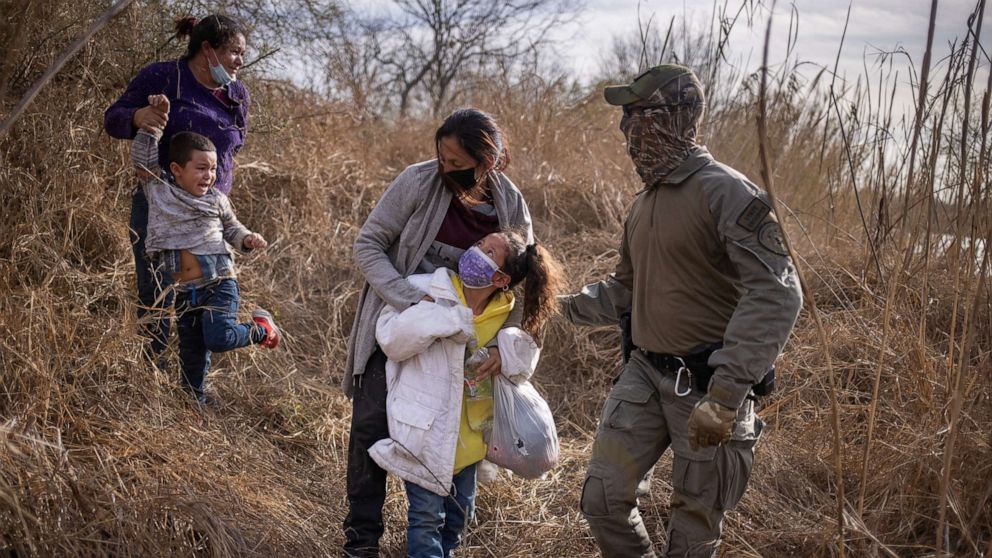Migrant surge at border poses political threat to Biden
When President Joe Biden entered office, he listed what he called "four historic crises:" the coronavirus pandemic, the economy, a reckoning on race and climate change.
Not among them was a predicament that, two months into his presidency, now poses a potent political threat: the growing number of migrants and unaccompanied children showing up on the southern border and filling federal facilities many times over their capacity.
Republicans have seized on the influx -- which the White House has been reticent to label a "crisis" -- by arguing Biden's team was unprepared for migrants' reaction to his attempts to roll back former President Donald Trump's strict policies.
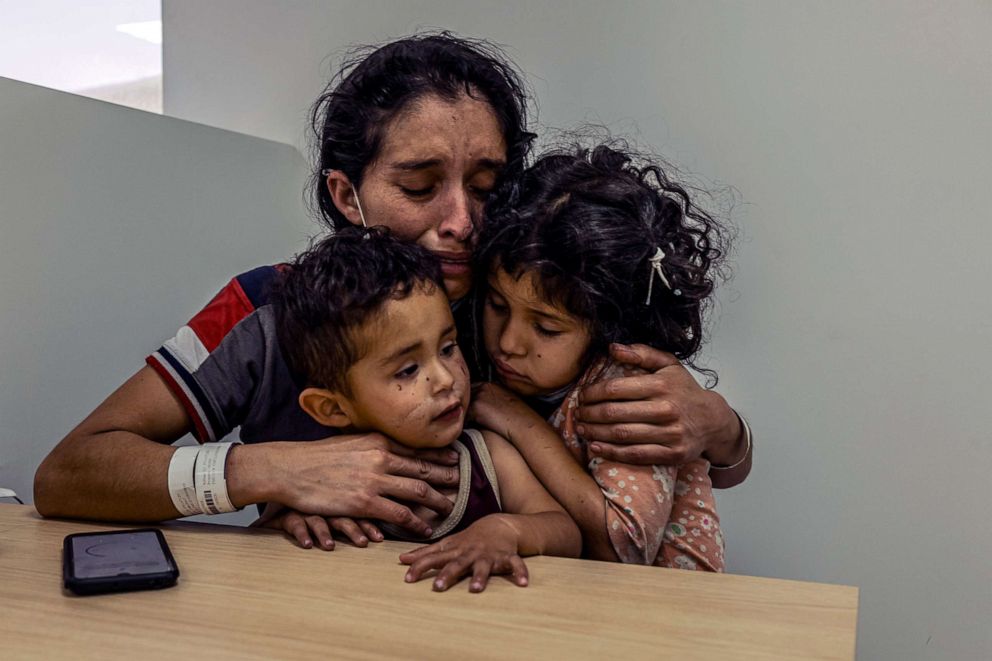
The Biden administration, meanwhile, has pointed fingers at Trump -- saying his administration exacerbated the situation by systematically ripping families apart, treating people fleeing violence and poverty with inhumanity, and neglecting or dismantling the system set up to deal with them.
"It is especially challenging and difficult now, because the entire system under United States law that has been in place throughout administrations of both parties was dismantled in its entirety by the Trump administration," Homeland Security Secretary Alejandro Mayorkas said on ABC's "This Week" Sunday. "So we are rebuilding the system as we address the needs of vulnerable children who arrive at our borders."
Biden has taken a slew of executive actions since taking office that have taken aim at Trump’s policies -- from kicking off wide-ranging reviews and halting the construction of the wall on the southern border to creating a task force aimed at reuniting migrant families separated under Trump.
He also proposed a bill that would provide a pathway to citizenship for 11 million undocumented immigrants in the United States, among other major reforms. And, unlike Trump, he has put more of a focus on addressing the root causes of migration from the Central American countries from which a large percentage of migrants come from, Honduras, Guatemala and El Salvador.
But the White House has over the past month increasingly found itself on the defensive as it balances its message that the border is "closed" with its stated desire to find safe places for the minors who keep crossing the border unaccompanied by their parents.
"Surges tend to respond to hope, and there was a significant hope for a more humane policy after four years of, you know, pent-up demand," the White House's coordinator for the southern border, Ambassador Roberta Jacobson, said earlier this month when a reporter asked her if it was a "coincidence" that the latest influx of people choosing to come to the United States started as Biden entered office.
"I don't know whether I would call that a coincidence," she said, "but I certainly think that the idea that a more humane policy would be in place may have driven people to make that decision."
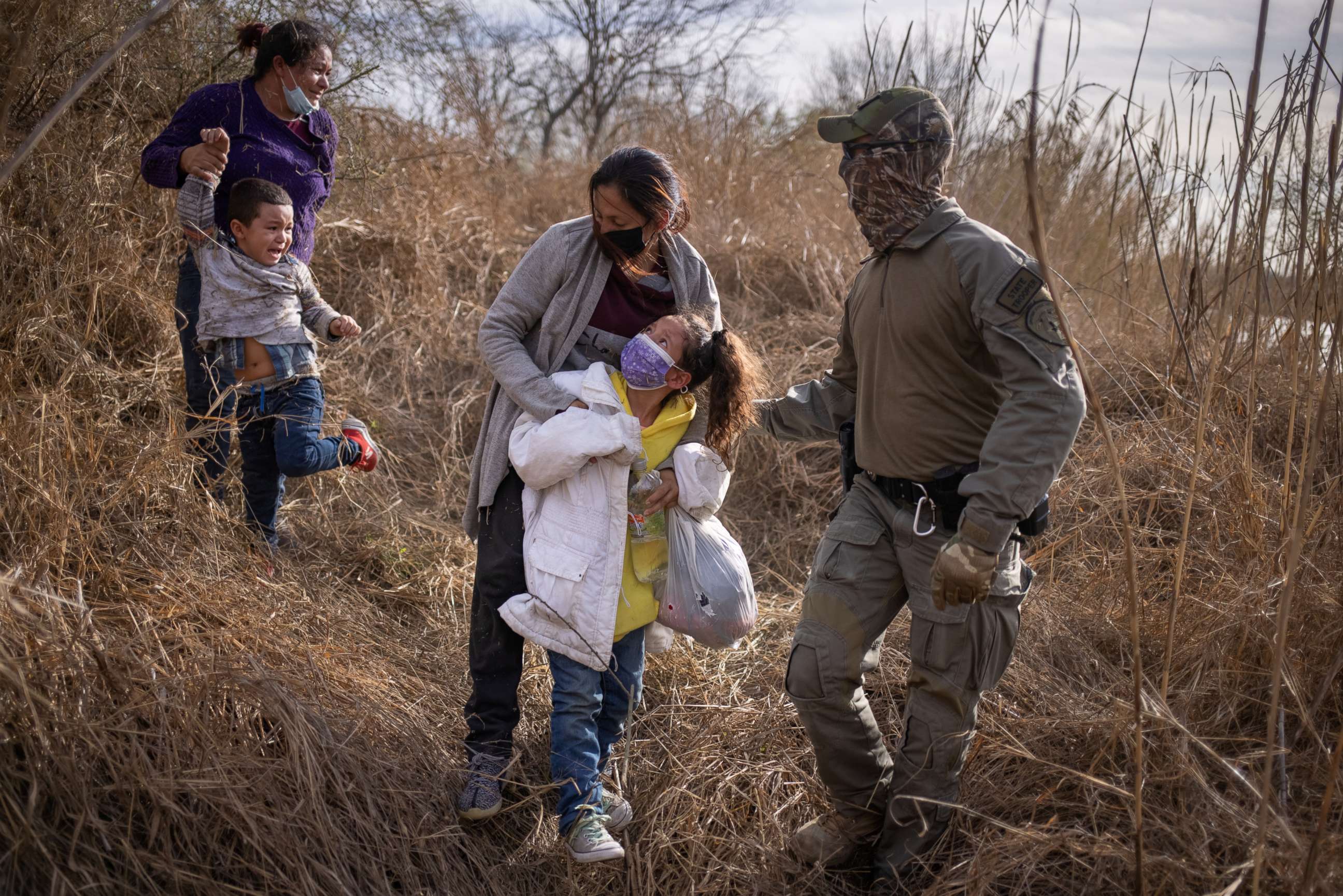
Anecdotally, some migrants said they have been buoyed by Biden's friendlier rhetoric and an impression they'll be treated more humanely than they were under Trump.
A Brazilian man who traveled with his wife and young children to Mexico before crossing the U.S. border told ABC News that he "definitely" would not have tried to come when Trump was president and "basically" came now because Biden had taken office.
"The main thing was the violence in my country," the man, who requested anonymity, said. "And the second thing I think was Joe Biden. You know, it's like it lightened up my hope."
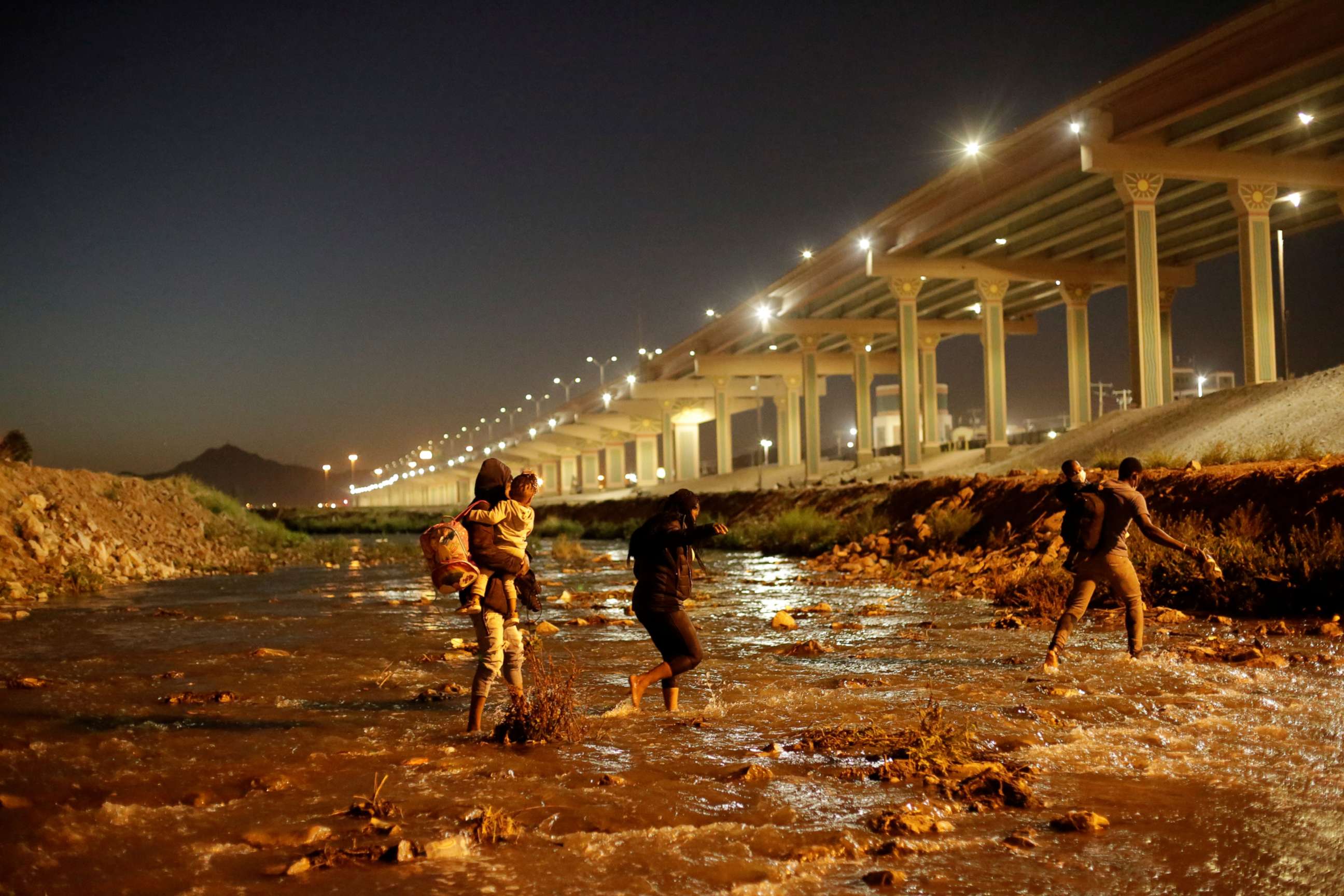
In an interview last week, Biden told ABC News' George Stephanopoulos that his administration was working to allow migrants to apply for asylum from their home countries without first making the arduous journey to the United States. Trump had halted a program that let minors do just that.
The Biden administration has kept the news media away from packed facilities along the U.S.-Mexico border -- the White House has promised "transparency" while repeatedly citing health and privacy concerns -- although it has allowed a series of members of Congress and senior government officials to see the conditions.
And in a departure from the Trump and Obama administrations, it has not allowed journalists to accompany U.S. Border Patrol officers on the job, preventing members of the media from speaking with migrants as they are taken into custody.
In 2018, the Trump administration allowed reporters into a U.S. Customs and Border Protection facility in McAllen, Texas, where children were being detained in large chain-link enclosures waiting for transfer to the custody of the U.S. Department of Health and Human Services -- a wait that often lasted several days or longer. Many of those children were separated from their relatives as a matter of policy and the Trump administration was severely criticized for keeping children in "cages."
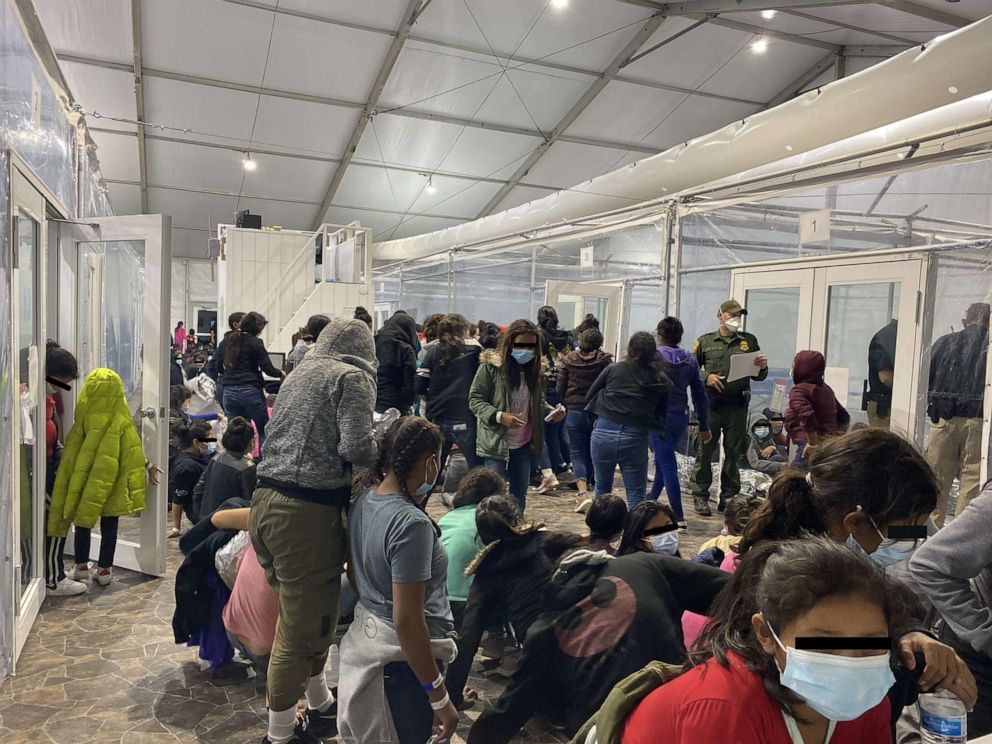
Some of the first photographs made public under the Biden administration from inside one of the facilities holding migrants, including families with children, came Monday from Rep. Henry Cuellar, D-Texas. The images, which Cuellar said were taken over the weekend, showed migrants sitting in crowded, makeshift quarters inside a CBP overflow facility in Donna, Texas.
There are now over 5,000 minors in CBP custody -- a record, according to people familiar with the data. By law, they are only supposed to stay in the detention-like facilities for up to 72 hours before being sent to live with sponsors or transferred to shelters run by the Department of Health and Human Services, but the department is at capacity and struggling to keep up with the influx and minors are often staying in the crowded facilities past the legal limit.
Biden himself has yet to visit, although when a reporter asked him on Sunday if was he thinking of going, he said, "at some point, I will." He said already knew "what's going on in those facilities."
Vice President Kamala Harris, too, was asked Monday if she planned to go.
"Not today," she said laughing, in Jacksonville, Florida, where she participated in two coronavirus-related events. "But I have before and I'm sure I will again."
For weeks, the Biden administration has been focused on promoting its $1.9 trillion COVID-19 relief package, eager to take credit for direct payments to Americans and myriad other benefits to those suffering the economic impact of the coronavirus pandemic. Biden, Harris and their spouses have been traveling the country preaching about its impact.
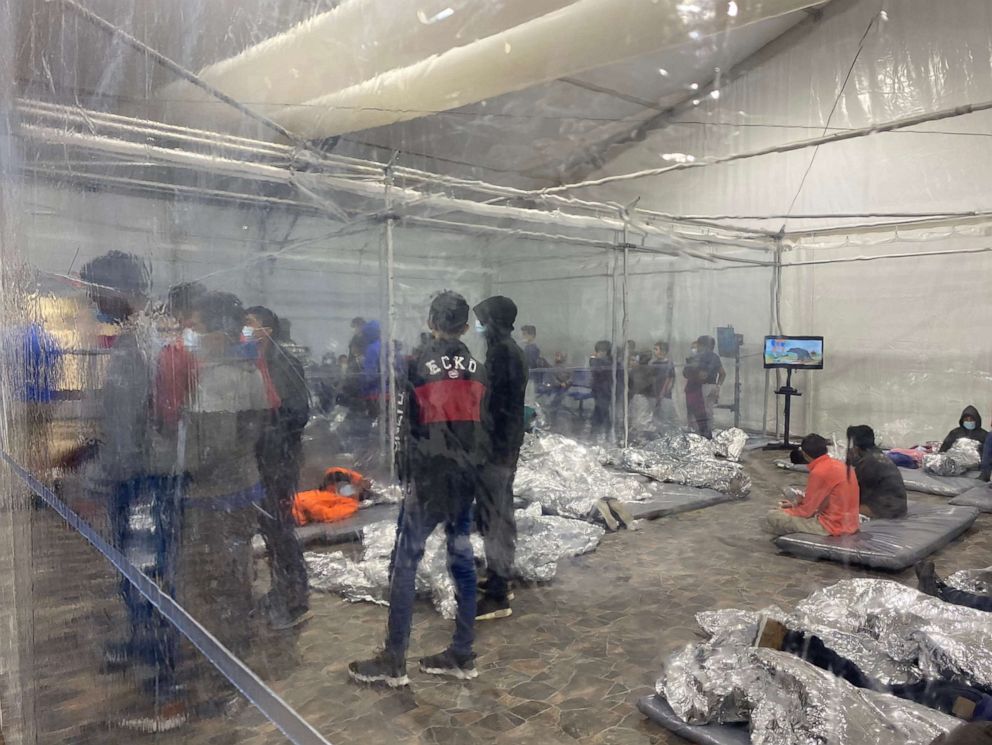
Trump himself has criticized Biden's approach. On Monday he painted the same inaccurate picture that helped get him elected in 2016.
"They are violent people," Trump said in an interview with Fox News. "Many of the people coming, these countries don't send out their finest and in some cases I'm sure you have wonderful, fine people, but you also have criminals, you have murderers, you have sex traffickers, you have a lot of very bad people coming into our country."
In reality, the current surge is almost entirely made up of unaccompanied children, families and other migrants fleeing violence and poverty, authorities told ABC News.
They typically endure a dangerous journey from Central America, often with the help of human traffickers called "coyotes." After making it across the border, many seek out U.S. authorities to start the process of claiming asylum.
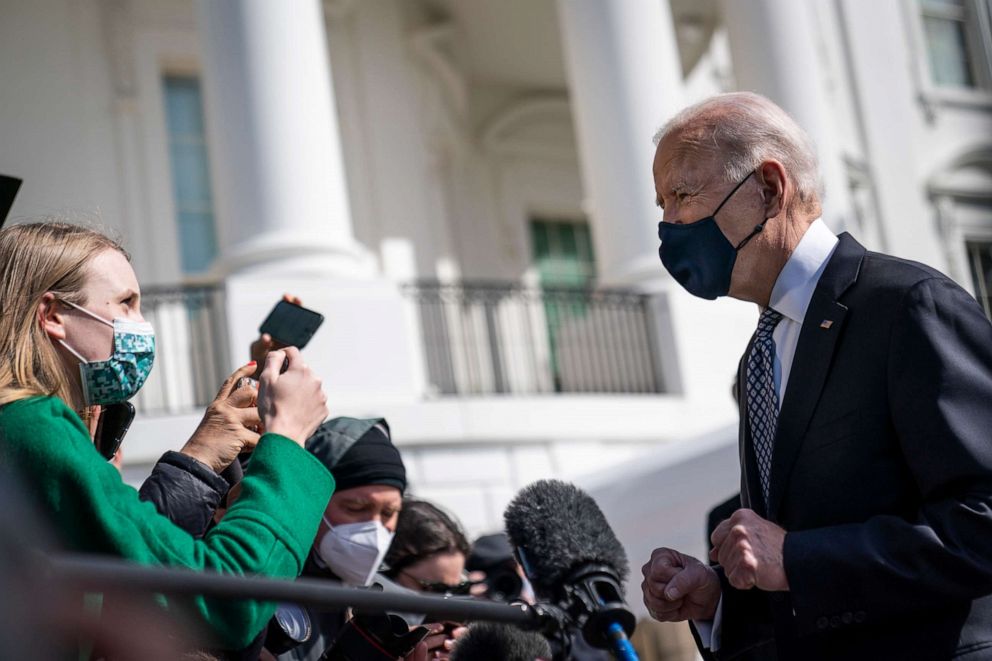
While Republicans have been quick to criticize Biden, Democrats, too, have expressed concern.
Sen. Chris Murphy, D-Conn., accompanied Mayorkas during a visit to border facilities on Friday, and said he "fought back tears" when a 13-year-old girl sobbed and explained that she was "terrified" being apart from her family, including her parents in the United States.
But, he tweeted, "the Biden Administration is trying their best to uphold the rule of law with humanity."
"They have a ton of work ahead to clean up the mess Trump left them," he added, "but their intentions are true."
ABC News' Martha Raddatz, Cecilia Vega, Matt Gutman, Benjamin Siegel, Mike Levine, Quinn Owen and Will Steakin contributed to this report.
